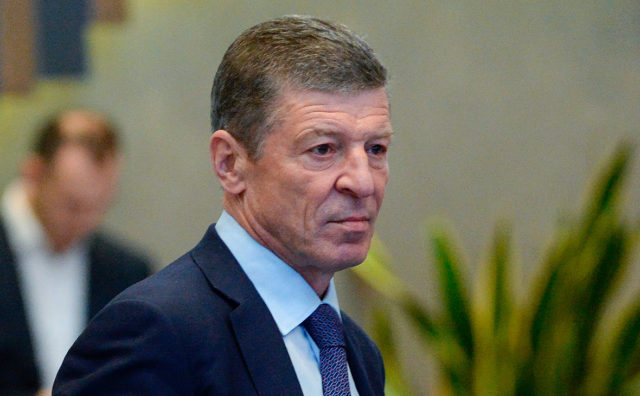
Moscow Declares Pause in Normandy Negotiations on Ukraine
Publication: Eurasia Daily Monitor Volume: 17 Issue: 100
By:

Russia’s presidential envoy for conflict-management in Ukraine, Dmitry Kozak, has unilaterally announced a pause in the Normandy negotiation process, pending “clarifications to Ukraine’s positions.” Kozak’s announcements concluded and followed the “Normandy” meeting (Germany, France, Russia, Ukraine), held on July 3–4, in Berlin, at the level of diplomatic advisors to the four heads of state and government.
The Berlin meeting was held in spite of the coronavirus emergency and lasted 11 hours without breaks, apparently reflecting a sense of urgency on the part of Berlin, Paris and Kyiv (each from its own considerations) to energize the Normandy process. Moscow’s envoy, Kozak, however, saw to it that the meeting failed to produce a concluding document or any decision by quadripartite consensus. Some concluding document is supposed to be coordinated among the four sides by telephone, at an unspecified later time. In Berlin, they only agreed on recommending to the Minsk Contact Group to discuss “additional ceasefire measures in the very near future [no deadline stated]” (Ukrinform, July 4; TASS, July 4, 8).
According to Kozak, the Ukrainian side failed to clarify how it interprets the Minsk “accords”; whether these contain binding obligations for Ukraine; when would Kyiv submit constitutional amendments on the country’s decentralization; whether Kyiv would enshrine a special status for the “certain areas of the Donetsk and Luhansk provinces” (ORDLO) into Ukraine’s constitution; when would Kyiv incorporate the so-called Steinmeier Formula into the law on the special status; and when Kyiv would start negotiating with Donetsk-Luhansk on the actual terms of the special status under the Minsk “accords.” The Ukrainian delegates’ answers to these questions (and undoubtedly other questions along similar lines) fell short of satisfying Kozak (TASS, July 4, 8). Deputy Prime Minister Oleksiy Reznikov’s account to Ukrainian media corroborates elements of Kozak’s account (Liga.net, July 7).
Kozak’s style of questioning reflects Moscow’s strict constructionist reading of its own writing on the Minsk parchments. Furthermore, Kozak reminded the Ukrainians (and ipso facto the Germans and French attending) that the ORDLO special status law is meant to be a framework law, necessitating the further adoption of “dozens of implementing laws,” again by negotiation between Kyiv and Donetsk-Luhansk. This, too, conforms to the Minsk Two “agreement”; and Kozak’s public reminder of it is a replay of his predecessor Vladislav Surkov’s periodic admonitions to Kyiv on that score.
Absent Ukrainian concessions, Kozak ruled out a summit opportunity for President Volodymyr Zelenskyy. “The Ukrainians attempted to discuss setting a date for a Berlin summit. But this is far, far too early to discuss” (TASS, July 4, 8). His provocative questions to the Ukrainians, however, are not preconditions to holding a summit. They are preconditions to moving toward the final stage of negotiating a political settlement.
Moscow’s preconditions to holding a summit seem, at this stage, compatible with Berlin’s and Paris’s. In the political compartment, they entail updating the “special status” law in a form more constraining on Ukraine and incorporating the Steinmeier Formula. In the security compartment, Ukraine is being asked to accept decisions in the Minsk Contact Group that could reproduce the Transnistria model of conflict conservation in Russia’s favor (as opposed to conflict resolution) in Ukraine’s east. International disengagement from the conflict and easing the sanctions on Russia would probably ensue. This is the sense of the Berlin meeting’s recommendations for the Minsk Contact Group to adopt at its upcoming meetings (from July 8 onward): disengagement of troops, de-mining, opening a large number of crossing points on the demarcation line, easing movement and trading across the demarcation line, mutual exchanges of detained persons, as well as various humanitarian measures. All of this would necessarily involve cooperation between Ukrainian authorities and Russia’s local proxies, the latter’s de facto acceptance, and eventual “normalization” of a Russian-imposed status quo. Political resolution would remain a theoretical goal for an indefinite future.
The non-outcome in Berlin, however, is favorable to Ukraine’s interests; although its delegates, Reznikov and Presidential Office chief Andriy Yermak, seem ambivalent about it. They managed to withhold any further concessions to Russia, but they are disappointed over the lack of “progress” toward a summit of the Normandy heads of state and government.
Their ambivalence is traceable to the dual agenda they brought to this meeting: to protect Ukraine’s interests but also to clear the path for President Zelenskyy to another Normandy summit. Zelenskyy seems eager for it again, and Russia would allow it at the expense of Ukrainian concessions, as in 2019.
With his president in mind, Yermak claimed that the Berlin meeting “has brought a Normandy summit one step closer”; furthermore, the Minsk Contact Group’s upcoming meetings “could bring the positions closer and open the way to the summit” (President.gov.us, July 4). The first part does not correspond with the facts; while the second part may yet materialize at the expense of Ukrainian interests. For his part, Reznikov apparently, in all sincerity, misread the situation to predict a Normandy summit in August (Novosti Donbasa, July 5; Ukrinform, July 6), prompting Kozak to dismiss the idea repeatedly.
On substance (as distinct from atmospherics), the Ukrainians held their own successfully at the Berlin meeting. They have finally abandoned the even hypothetical possibility of “elections” being held in the Russian-controlled territory by October; they ruled out enshrining the “special status” in the constitution, and they attempted to separate any law on ORDLO’s special status from Ukraine’s country-wide administrative de-centralization. Moscow, however, continues asking for the country-wide de-centralization reform to be discussed in the Minsk Contact Group. This, if accepted, would provide Russia with additional leverage over Ukraine. The Minsk “accords” are ambiguous on this point, and Moscow will try to impose its reading.



